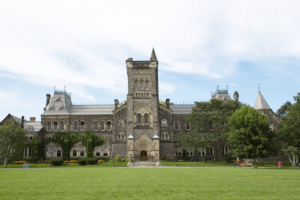Civil engineers study the designing of various structures, their construction, and work towards their maintenance. Students in the program learn the process of designing infrastructure elements such as dams, highways, and bridges. The program in the civil engineering universities in Canada has different options of which the students need to choose from the given subjects: Geotechnical engineering technology, Engineering mechanics, International Development, Project management, Transportation engineering, Structural engineering, and Water resources engineering. Civil Engineers have a high demand in Canada. Civil Engineering Universities in Canada offer brilliant opportunities for students to gain a qualification that makes them eligible for getting a job as a Civil Engineer in Canada.
Civil engineering students in Canada need to undergo a basic undergraduate education of 4 years. The students are required to understand the concepts of environmental science, soil mechanics, material properties, drawing skills, construction management, mapping, and even surveying. After finishing their undergraduate degree in any of the Canadian universities, international students have the opportunity to work as an Engineer in Training (EIT) for some years before getting their P. Eng, professional engineering designation in Canada and working in civil engineering jobs to gain work experience, or they can opt to continue their studies further.
In this article, we will look at the detailed information on civil engineering courses in Canada and the admission process and eligibility requirements of the civil engineering universities in Canada.
Why Study Civil Engineering in Canada?
Civil Engineering in Canada is a popular option for further study. Some of the reasons to opt for civil engineering universities in Canada are as follows:
- As per QS Universities Ranking, 4 of the civil engineering colleges in Canada are ranked in the 100 Global universities for civil engineering.
- Canada is one of the highest paying countries for civil engineering jobs. It is ranked 6 among the top 10 highest paying countries.
- Civil Engineering in Canada can make an individual eligible to earn about 25 to 61 CAD per hour.
- Until the professional licence of a civil engineer is issued, they can work under a licensed engineer for work experience and practice.
- In Ontario, Alberta, and British Columbia, civil engineering is one of the top industries for growth and employment.
Check Your Eligibility for 80+ Universities across Canada
Book a free counselling session and find universities where you can get an Admission!

Check Your Eligibility for 80+ Universities across Canada

Book a free counselling session and find universities where you can get an Admission!
Top Civil Engineering Colleges in Canada
Some of the top universities offering Civil Engineering courses in Canada are:
University of Waterloo
The University of Waterloo is a public university that is focused on research. It is located in the eastern Ontario province, known as Waterloo. The civil engineering program of the University of Waterloo is the largest civil engineering program in Canada. Ranked 5th in Canada and top 100 in the QS University Rankings all over the world.
Courses Offered
- Bachelor of Applied Science[BAsc] Civil Engineering
- Master of Applied Science [M.Asc] Civil Engineering
Entry requirements
- The applicants must have passed Class 12th with an overall 85 per cent in the 5 required subjects.
- Required Subjects: A minimum of 70% of the final grade in Advanced Functions, Calculus and Vectors, Chemistry, English (ENG4U), Physics
- Applicants must have passed in a first or second division from one of the following:
- Indian School Certificate, given by CISCE
- All India Senior School Certificate, given by CBSE
- Other pre-university or Class 12 certificates awarded after 12 years of academic education
- TOEFL Marks of 90/120 with 25 marks in writing and speaking
- IELTS score of 6.5/9 with 6.0 score in reading & listening and 6.5 in writing & speaking
- GPA of at least 3.0 or 4.0.
Tuition Fees
The tuition fee for the bachelor’s program in civil engineering is 56,869 CAD, with an application fee of CAD 156.
Application Process
- Aspirants of the program are required to fill out the application form online on OUAC (Ontario Universities Application Centre) and submit their academic transcripts, statement of purpose, English language results, and other required documents.
- Students also need to fill out the Application Information Form sent by the university and upload their official transcripts.
- The selected candidates will then be notified of the offer on the accounts of the university, which is to be submitted within a certain deadline.
University of Toronto
The University of Toronto is a research university located in the largest city of Canada, Toronto. The civil engineering department of the college offers undergraduate specialisations, master’s degrees as well as a lot of research programs. The students of the civil engineering department in college can choose from various courses such as transportation planning, geomechanics, and structural engineering to enhance their understanding of subjects of civil engineering.
Courses Offered
- Bachelor of Applied Science [B.ASc] Civil Engineering
- Master of Applied Science [M.ASc] Civil Engineering
- Master of Engineering [MEng] Civil Engineering
Entry requirements
- Applicants must have a minimum grade of 70%.
- They must have completed Ontario Secondary School Diploma Six 4U(University) or M (University/College) courses of English, Calculus, and Vectors.
- Average Score in TOEFL: 100/120
- Average Score in SAT: 1330/1600
Tuition Fees
The tuition fees for a Civil Engineering Course at the University of Toronto can range from 62183.53 CAD to 62853.98 CAD.
Application Process
- Submit the required documents with the application form.
- Apply for an entry visa and a study permit once you receive an application letter from the university.
- Once they obtain a visa, the students can enrol in the university and complete their degree.
University of British Columbia
The University of British Columbia is a public research university located in Vancouver, the western city of Canada. With over 68,000 students from Canada and other 140+ countries, the university consistently ranks among the top 10 public universities. The civil engineering program at UBC focuses on the areas such as Engineering Drawing and CAD or CAM, Instrumentation and Data Analysis, System Dynamics, Construction Engineering, Mechanical Engineering, etc.
Courses Offered
- Master of Engineering [M.Eng] Civil Engineering
- Bachelor of Applied Science [B.ASc] Civil Engineering
- Master of Applied Science [M.ASc] Civil Engineering
Entry Requirements
- Applicants must have scored a minimum of 70% in their Grade 11 & Grade 12 classes.
- The applicants must have studied Science in Class 10 and Chemistry, Physics, and Mathematics in Class 12.
- Required Average Score in IELTS: 6.0/9
- Required Average Score in TOEFL: 90/120
Tuition Fee
The tuition fee for a civil engineering course at the University of British Columbia (UBC) ranges from 20783.71 to 53467.78 CAD.
Admission Process
- Submit the application form with an application fee in the range of 118.5 to 168.25 CAD along with the required documents such as a valid passport, academic transcripts, English proficiency scores, statement of purpose, and a resume.
- Once the application is approved by the university, you will receive an offer in the mail.
- Meanwhile, you can apply for a study permit and visa.
- After the offer, pay the course fees and start with your course.
McGill University
McGill University has over 500 undergraduate programs and 93 graduate and doctoral programs for international students. The university has an acceptance rate of 38%. The university is often regarded as one of the best Canadian universities for the brightest students across the world. The university guarantees placements in top companies like Google, Amazon, and Microsoft.
Courses Offered
- Bachelor of Engineering [B.Eng] Civil Engineering
- Master of Engineering [M.Eng] Civil Engineering – Environmental Engineering
- Master of Science [M.Sc] Civil Engineering
Entry Requirements
- An average of A grade in 10, 11, and 12th classes or an equivalent of overall 60% average in Class 12.
- Required Average Score in IELTS: 6.5/9
- Required Average Score in TOEFL: 86/120
- Required Average Score in SAT: 1430/1600
Tuition Fee
The tuition fee for a civil engineering degree at McGill University ranges from 18772.39 CAD to 49612.74 CAD.
Admission Process
- Create an account on the official college website and check all the eligibility requirements for the course.
- Submit an application form. Make sure to fill in the details carefully as an error in the form cannot be rectified. In case of any error, submit a separate form.
- Fill in the test scores and GPA.
- Pay a non-refundable fee with the application form.
- After that, you will receive the confirmation mail from the university.
- Apply for an international study visa and enrol in the course.
Concordia University
Concordia University provides international students with a high quality of education at a comparatively low cost of attendance. The students of the university have an active lifestyle through various clubs and varsity teams. The university also offers scholarships to international students and has an almost 90% placement rate.
Courses Offered
- Master of Applied Science [M.ASc] Civil Engineering
- Master of Engineering [M.Eng] Civil Engineering
- Bachelor of Engineering [B.Eng] Civil Engineering
Eligibility Requirements
- The students should have a minimum of 70% grade in a minimum of 4 subjects of Class 12th, including English.
- Required Average Score in IELTS: 7/9
- Required Average Score in TOEFL: 90/120
- Required Average Score in PTE: 61/90
Tuition Fee
The tuition fee for the civil engineering courses in Canada ranges from 16928.67 CAD to 25141.59 CAD.
Application Process
The students are required to fill out the application form and submit the following documents with the same:
- Financial Documentation showing proof of finances and financial background of a student.
- Academic Transcripts from the previous educational institutions.
- Statement of Purpose written by the student.
- An updated resume or CV of the student.
- Official scores of English Language Test Proficiency Exams such as IELTS or TOEFL.
About two weeks after the submission of the admission form, the university will send the result or status update for the same on the email id of the candidate. After that, one can apply for the study permit at the Canadian embassy to further confirm the enrollment of the course.
Other Civil Engineering Universities in Canada
Some of the other best universities for civil engineering in Canada are as follows:
- University of Alberta, Edmonton
- McMaster University, Hamilton
- Western University, London
- University of Calgary, Calgary
- University of Ottawa, Ottawa
- University of Saskatchewan, Saskatoon
- University of Victoria, Victoria
Career Scope for Civil Engineers in Canada
There are wide opportunities in the field of civil engineering within various sectors as well as industries. Some of the best career aspects and their average median salary are:
- Civil Engineer – 50,700 CAD
- Civil Superintendent – 110,000 CAD
- Senior Project Manager – 115,440 CAD
- Contract Administrator – 44,925 CAD
- Civil Engineering Technologist – 50,000 CAD
Top Recruiters for Civil Engineers in Canada
Some of the top recruiters for individuals who have completed civil engineering courses in Canada and their average entry-level packages per year are:
- Morrison – 51,000 CAD
- SNC Lavalin – 60,000 CAD
- Aecon – 50,000 CAD
- Bird & Bird – 80,000 CAD
Conclusion
There are more than 70 universities offering civil engineering courses in Canada. Some of the top universities that consistently rank higher globally include McGill University, the University of British Columbia, and the University of Waterloo. The demand for civil engineers in Canada is ever increasing with an expected growth of 2500 openings in the next 5 years in the civil engineering sector. With the highest demand for civil engineers, Ontario is the best province for civil engineering jobs in Canada. International aspirants of civil engineering courses in Canada are required to demonstrate their proficiency in the English language, CV, academic transcripts, LOR for admission in civil engineering colleges in Canada.
LeapScholar can help you study in Canada, identify the best university for civil engineering, and further guide you throughout the admission process.
Frequently Asked Questions
1. What is the average salary of a civil engineer in Canada?
As per the data from the Government of Canada, the average hourly wage of a civil engineer in Canada is around 25 to 61.54 CAD per hour. The average salary of a civil engineer also depends on the designation and skill set of an individual. However, postgraduates starting as freshers in the industry can earn median salaries starting from 45,000 CAD or 24 Lakhs INR.
2. Are there any scholarships for civil engineers for Indian students in Canada?
Some of the scholarships for Indian students for civil engineering courses in Canada are as follows:
a. Hira and Kamal Ahuja Award in Engineering
b. Faculty of Engineering Awards
c. Vanier Canada Graduate Scholarship
d. Ontario Graduate Scholarship
e. Concordia International Tuition Award of Excellence
3. What are the main documents required for admission to civil engineering courses in Canada?
Some of the important documents that you will have to submit to apply to civil engineering universities in Canada are:
a. Proof of Academic Achievements such as academic transcripts from previous educational institutions.
b. Personal Statement or SOPs
c. Proof of Funds for the first year and Financial Background History of the individual
d. Proof of English Proficiency/Qualification test scores such as IELTS or TOEFL
e. CV or Resume
f. Letter of Recommendations






